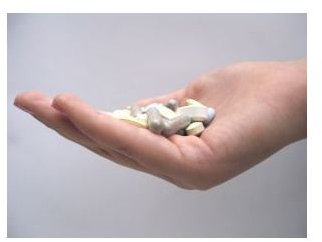Does Chromium Picolinate Increase the Metabolism?
The Scoop
“Lowering body fat and increasing lean body mass are just a few of the positive properties that chromium exhibits on the body,” says Higher Power’s diet aid <em>Chromium Picolinate</em>,a herbal supplement that claims to increase lean body mass by speeding up the metabolism. Higher Power isn’t the only company to get in on the Chromium Picolinate trend either—hundreds of companies are including it in herbal diabetes supplements, diet aids, bodybuilding supplements, and even alternative “feel good” medications.
One expert from the Go Ask Alice panel at Columbia University disagrees with these claims, however.
“The research conducted on chromium picolinate has found it to neither add nor detract from a person’s health and fitness level,” she says. “In our weight-conscious society, claims like this sell products. Period.”
So who is correct—the supplement manufacturers or the experts? Let’s review both sides to see if chromium picolinate really increases the metabolism.
The Manufacturers’ Side
For years—even as far back as 1994—diet manufacturers claimed chromium picolinate increased the metabolism, causing significant weight loss. They also claimed it increased lean muscle mass while decreasing body fat.
One study, conducted in 1998 and reported in Current Therapeutic Research, indicates this could be true. According to the study, 122 overweight patients who took chromium picolinate lost twice as much weight as the people in the placebo group.
They also decreased body fat without losing any lean muscle. The study did not indicate if it chromium picolinate improved the metabolism.
“It has been proposed that chromium picolinate’s positive effect on body composition is through its ability to improve insulin utilisation (sic), thereby reducing fat deposition,” says the researchers from the study. That would seem to be the winning argument for manufacturers who claim chromium picolinate increases the metabolism, but several other studies contradict these findings.
The Experts’ Side
Although a couple of studies indicate it increases weight loss, the number of studies showing no metabolic benefits are exceedingly high.
Take the study conducted by Trent and Thieding-Cancel in 1995, which examined chromium picolinate’s metabolic and fat burning potential in obese patients. The results were less impressive, with no noticeable differences in fat distribution.
Another study reported by <em>Vanderbilt University</em> also reported similar effects. Obese women who took approximately 200 mcg of chromium picolinate per day for nine weeks did not experience any weight loss or metabolic benefits. Instead, the study showed women actually gained weight.
Several other studies also conducted in the 1990’s also show it had no effect on the metabolism or weight loss.
Who’s Right?
Manufacturers only have a few studies to lean on, and those studies are long outdated. Numerous, newer studies consistently prove it has no effect on the metabolism—in some cases, it actually resulted in weight gain.
If you want to use a supplement to lose weight, chromium picolinate may not be the most effective coice. There is currently not enough evidence proving it is a legitimate weight loss aid. But why do manufacturers continue to sell it with exaggerated claims even after this fact? As the expert from go Ask Alice said, claims such as chromium picolinate increasing the metabolism sells because America obsesses about weight loss. Period.
